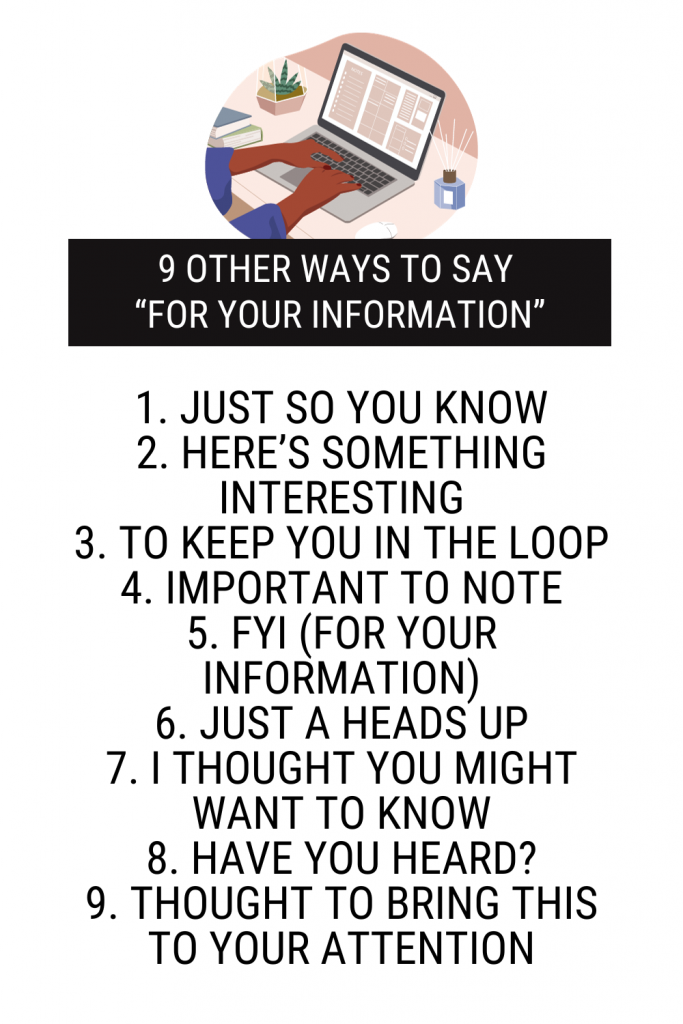So say you have something really important to tell someone. Maybe you’re tipping off a co-worker about some big development, giving a friend the backstory on something you’re doing together, or just spreading good information and “for your information” is a convenient way to make it clear, but there are many ways to convey the message that you’re giving them key things to know. I mean you can say all kinds of things – I wanted you to be aware. . . or I thought you should know about it. . . There really is no shortage of phrases to inform someone when you have something useful to convey.
Other Ways to Say “For Your Information”
Informative Introductions
Starting off with the right phrase can set the tone for the information you’re about to share. Here are some alternatives to “for your information”:
1. Just So You Know
Example: “I’ve checked the report, and just so you know, there are a few discrepancies we need to address.”
Meaning: “Just so you know” is a good way to share things in a relaxed yet knowledgeable way. It lets people know what’s going on without freaking out. Kind of like how, FYI, it sounds like a tie and a coat, you know? Anyway, just so you know, it works in work or friendly-type conversations.
2. Here’s Something Interesting
Example: “Here’s something interesting: our new marketing strategy has increased engagement by 40%.”
Meaning: It really grabs people’s attention and lets them know that not only is what you’re saying important, but it’s also pretty wild or unexpected or something. Use it when you really want to wind someone up and drop some juicy info.
3. To Keep You in the Loop
Example: “I wanted to keep you in the loop – the client has moved the deadline to next Monday.”
Meaning: “To keep you in the loop” means you want to keep someone informed of what’s going on. So if you have a big project with a lot of moving parts, or you’re on a team where everyone needs a 4-1-1, throw it in so they know you want to keep them filled.
Direct and Clear Alternatives
Sometimes, a direct approach is best. Here are phrases that convey information straightforwardly:
4. Important to Note
Example: “It’s important to note that the policy changes will take effect from next month.”
Meaning: When you really need someone to tune in to what you’re saying, “important to note” is a good way to flag it. Whether you’re at work or just chatting with friends, it tells people to listen up because what’s next matters.
5. FYI (For Your Information)
Example: “FYI, the meeting has been rescheduled to 3 PM tomorrow.”
Meaning: FYI is kind of the shorthand version of for your information. It’s all over emails and texts these days as a quick heads up and you can use it pretty much anywhere – at the office in a memo or with your buds over text.
Polite and Considerate Phrases
When a softer touch is needed, these phrases can convey information in a polite and considerate manner:
6. Just a Heads Up
Example: “Just a heads up, the office will be closed next Friday for maintenance.”
Meaning: Just wanted to give you a friendly heads-up that something’s happening so you can get ready. It’s not an emergency, just letting you know so you’re not surprised.
7. I Thought You Might Want to Know
Example: “I thought you might want to know that your article has been very well-received by the team.”
Meaning: This phrase shows thoughtfulness, indicating that you are sharing information because you believe it will be of interest or importance to the person. Use this in situations where the information is beneficial or positive for the listener.
Encouraging Involvement
Sometimes, the goal is to encourage dialogue or involvement. In such cases, these phrases can be effective:
8. Have You Heard?
Example: “Have you heard? The company is planning to expand to Europe next year.”
Meaning: “Have you heard?” is usually how you tell a friend that something new and interesting has happened that they should know about. It’s a friendly way to guide them to things without just rubbing them off. More for chat than serious business.
9. Thought to Bring This to Your Attention
Example: “I thought to bring this to your attention: the client has some concerns about the project timeline.”
Meaning: “Thought to bring this to your attention” is more when you really need the other person to focus. For example, if there is a problem at work or something they need to deal with. This is important information that I don’t want you to miss. More professional, but still shows you care enough.

Contextual Variations
Professional setting
In a professional setting where formal communication is the norm, using abbreviations like “FYI” might not always be appropriate. In such cases, opting for “important to note” or “to keep you in the loop” maintains a level of professionalism while effectively conveying the information.
Casual setting
In a more relaxed or informal setting, such as a conversation with friends or colleagues with whom you have a casual rapport, “just so you know,” “just a heads up,” or “have you heard?” are excellent choices. These expressions are less formal and can make the exchange more congenial.
Conclusion
When you’re talking to people, either at work or just chatting, how you say information matters a lot in getting your point across. Phrases like “FYI,” “just so you know,” “to keep you in the loop,” and others, might seem small, but they can change how people take what you’re telling them. Using the right ones shows respect makes people feel included, or puts importance on something you’re saying.
FAQs About Using “For Your Information”
1. Is “For Your Information” a polite phrase to use?
- “For Your Information” (FYI) can be polite or impolite depending on the context and tone. In formal emails or memos, it’s generally seen as a neutral way to present information. However, in verbal communication, it can sometimes come across as sarcastic or condescending, especially if said sharply.
2. Can “For Your Information” be used in formal settings?
- Yes, in written communication like emails or reports, “FYI” is often used in formal settings to introduce information that isn’t urgent but is still worth noting. However, it’s less commonly used in formal verbal exchanges.
3. How can I use “For Your Information” appropriately in a conversation?
- Use it when you need to add information that is relevant but not critical. Ensure your tone is friendly or neutral to avoid sounding condescending.
4. Are there situations where “FYI” is preferred over the full phrase?
- In casual or quick written communications, like texts or informal emails, “FYI” is often preferred for brevity. In more formal or detailed communications, spelling out the phrase can be more appropriate.
5. Is “For Your Information” suitable for all types of business communication?
- While it’s suitable for many types, it might not be ideal for very formal or sensitive communications. In such cases, a more detailed and specific phrase might be better.









